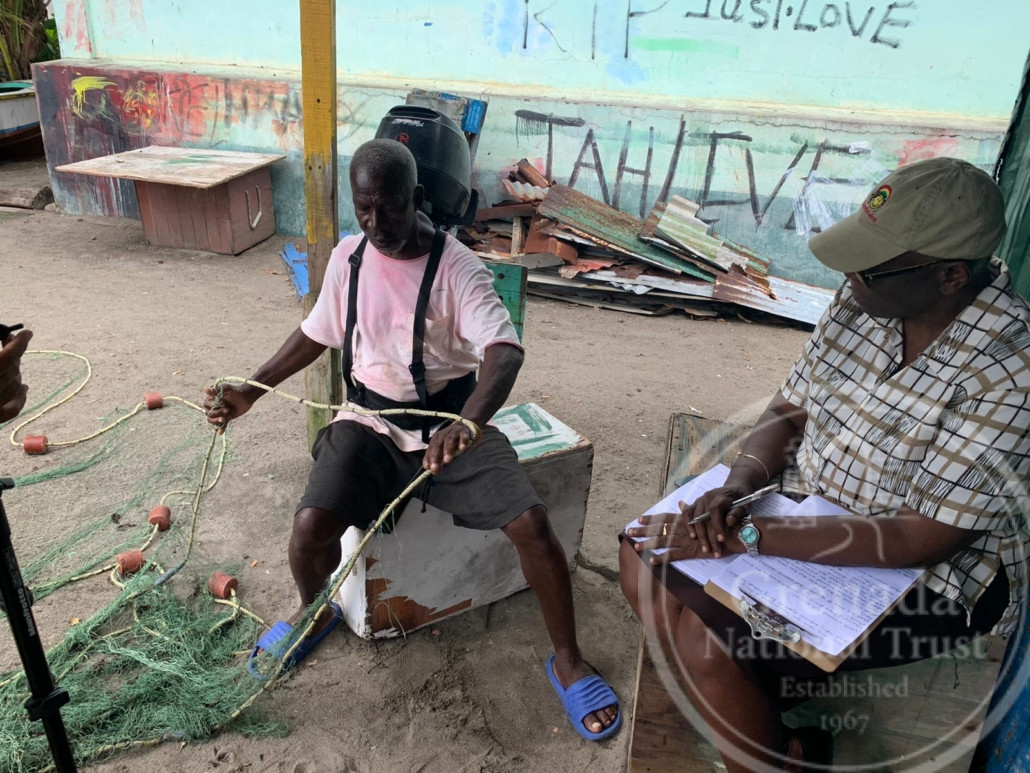Photo Credit: John James 2016
Fishing is a traditionally male dominated livelihood for many families living in coastal communities throughout the tri-island state of Grenada, Carriacou and Petite Martinique. While Petite Martinique is known for trawler fishing, Carriacou is known predominantly for seine, and Grenada is associated with seine, long line and hand-line. Some particular fishing communities are Gouyave in St. John, Grenville in St. Andrew, Sauteurs in St. Patrick, Grand Mal in St. George and Waltham in St. Mark. Desmond Gill and Daniel Phillip are two well-known practitioners.
Many fisherfolk still make and repair their seine nets by hand but others import their nets or buy them. The needles for hand-crafting the nets were traditionally made of wood but, today, are made of plastic and purchased locally. There are stores in Grenada where ready-made seine can be purchased whole or where practitioners can buy pieces of nets and/or needles to put together or amend damaged seine.
The standard equipment required for fishing expeditions varies depending on the type of fishing but includes boats, seine nets, needles and twine for repairing the nets, “stores”(a box containing food for survival in the event the crew go adrift), gas, ice, live-bait, bait sac, reels, lines, hooks, flags, and GPS.
Intangible elements associated with fishing include being able to understand moon cycles and their impact on fishing, being able to read bird behavior as that may be an indication of fish shoals and being physically fit.
Practitioners are willing to teach the trade but lament the lack of interest by younger generations and the stigma towards the livelihood. The elder practitioners think the lack of interest may be linked to the traditional perception of fishermen as being those who did not succeed in school. This is emphasized by a lack of respect for the trade in society overall resulting in fishing not being considered a highly regarded occupation among many people. The disrespect sometimes extends into the domestic sphere, affecting relations between fishermen and their spouses. The general perception of fishing needs to be changed to raise the profile and make it more respected by society. Due to these concerns, practitioners lack optimism about the future of traditional fishing such as seine fishing, and the continuation of the skills required to make and repair nets.
Some of the older fisherfolk believe that young practitioners see fishing as a ‘hustle’, a way to earn a casual wage or “quick money” to support the cost of a particular expenditure. This often means that they do not invest/turn-over their earnings from fishing. They also fail to consider the financial, organizational, and managerial skills that could be gained from the trade if they thought of their involvement as a business venture.
Other than the willingness of the elder practitioners to motivate and train the younger generation, no other measures to promote its continuation were identified by interviewees.

Daniel Phillip explaining fishing skills and tools
Photo credit: Maria Mafla
In October 2022, the Proud of my Heritage fieldwork teams were able to interview and recognise two fishermen, Daniel Phillip and Desmond Gill.

